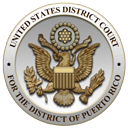Since the change of sovereignty in 1898, there have been thirty-two United States judges in Puerto Rico. The first, Noah Brooks Kent Pettingill, was appointed in 1899 to be the Judge of the Provisional United States Court established on June 27, 1899 by the military government pursuant to General Order No. 88. The Provisional Court was in existence until the Civil Government for the Island was formed in 1900 by an Act of Congress. In 1900, Congress also organized the first United States District Court for the District of Puerto Rico and provided for one judge to be appointed for a four year term. Judge Pettingill was then succeeded by the first true United States District Judge appointed for Puerto Rico, William Henry Holt. Like all judges who were appointed to the District of Puerto Rico before September 12, 1966, Judge Holt was an "Article I judge," appointed for a specific term of four years. Article I judges are so-called because they are appointed to courts created by Congress (legislative courts), pursuant to the powers granted to the Congress by Article I of the United States Constitution. Until September 12, 1966, the United States District Court for the District of Puerto Rico was a legislative court. On that day, however, Congress enacted a law which provided that all future appointments to the United States District Court for the District of Puerto Rico would hold office "during good behaviour," establishing the district court as a Constitutional Court pursuant to Article III of the Constitution. It is said that the Court was established as an Article III Court because Puerto Rico had "ceased" being a territory upon the establishment of the Commonwealth. The first judge appointed pursuant to the Constitution's Article III was Judge Hiram R. Cancio, who had been originally appointed under Article I.
These first twelve judges who were appointed to the federal bench in Puerto Rico were from the Continental United States. They were certainly not political "hacks." Though closely identified with a particular political party, their varied backgrounds made all of them qualified to be United States district judges. All were persons of integrity, impeccable character and admired in their communities. All were distinguished attorneys and some had been judges before their appointment to the federal bench here: two (Judges Chavez and Roberts) became Supreme Court justices in their native states; Judge Cooper had been the Governor of South Carolina; and, Judge Rodey founded the University of New Mexico.
On January 28, 1952, President Harry S. Truman nominated Clemente Ruiz Nazario to be the first native-born Puerto Rican United States district judge. Since then, all United States district judges nominated for the District of Puerto Rico have been Puerto Ricans.
